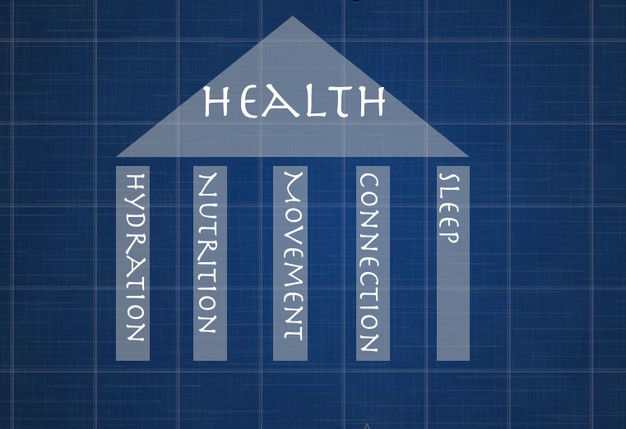What exactly does it mean to be ‘healthy’? Answers for this question can range based upon who you’re talking to, where in the world you are, and what someone values. But, the main proponent to this question is always based upon your lifestyle. In today’s world, life keeps us so busy that something as simple as eating an apple mid-day can constitute “healthy”. Overcommitting, under sleeping, and living at an unsustainable pace are all everyday norms pushed by society, thus putting the healthy aspects of life aside.
Health is simple. You don’t need 6 pack abs. You don’t need to be a vegetarian. You don’t even need to prepare meals 3 days in advance or workout for 2 hours a day. All you need to do is abide by these 5 health pillars.

1. Nutrition
Eat raw. It’s that simple. No, not raw meat.
Ask yourself: when grocery shopping, is the food you buy on the inside aisles or around the stores perimeter? More than likely your answer is the inside. That’s where all the long lasting food, chips, and crackers live. But, these foods have no real nutritional value and don’t encompass health.
Getting back to my initial point, eating raw means you eat the foods on the outside of the store; fresh vegetables, fruits, meats, and nuts. Putting these highly nutritious foods into your body will not only help you lose weight, but will make you feel better, diminish digestive pain, and keep you energetic throughout the day.
2. Sleep
Not only sleep at night, but give your body some rest and relaxation. This helps heal and repair your heart and blood. Research shows that proper sleep will decrease your risk for heart disease, kidney disease, type II diabetes and high blood pressure; you know, the diseases most of Americans are dealing with today.
With everyday life starting earlier and ending later, it’s almost impossible to allow yourself the proper amount of time to sleep at night. But, without 7-9 hours of sleep you are lowering your mental clarity, lessening attention span, and loosing control of your emotions. Think you need to stay up the extra 2 hours preparing for the big exam or presentation the next day? Consider getting sleep instead to be more attentive, focused, and feeling fully refreshed.
3. Connection
Rest and relaxation (sleep) is a huge proponent of connection. If life simply does not allow for you to get the recommended sleep, taking time for yourself throughout the day is key. I like to do a “5 minutes self-scan” where I go to a quiet place and reflect on how I am feeling. I start with my head and mind, understanding what I’m thinking and how I’m feeling. I then go all the way down and mentally feel if any limbs are tense or stressed. This forces the body to slow down and self-recognize how it’s feeling. This is key because it will bring a positive energy and more often than not, reduce any stress you’re experiencing.
Connection isn’t all about you. You also need to engage in social settings and do what you love. Having a solid support group is essential in health and wellness and without it happiness is a far cry. A lot of people who are ‘dieting’ to be healthy will erase the social aspect of their lives and in turn, will end up relapsing, either with alcohol or gluttony. Get out and learn how to be social and make good decisions, which in turn will lead to long term health and success.
4. Movement
Move everyday.
This can range from a high intensity resistance workout, to yoga, to a walk through the neighborhood.
Although the standard 10,000 steps is an ambiguous goal, shoot for it. A good rule of thumb is to be active for 90 minutes out of the day. Without boring you with the 45 minutes of calculations I just did (I’m a health guy not math) all you have to do is get up for 5 minutes every 30 minutes to achieve this goal. Sounds easy right? Try it and see how you do. Even if you’re working the standard 9-5 desk job, get up for some water or a brisk walk around the office.
5. Hydration
Drink coffee every morning? Yeah. Same. Caffeine is a natural diuretic which means you’re behind the 8 ball before even getting to work. A tip I like to use, is have a glass of water on your night stand, and before even getting out of bed, drink it all to counteract the diuretic effect the multiple cups of coffee you’re about to consume.
Try increasing your steps by making a water run. Hydration is key to, well, stay hydrated. The body is composed of 60% water and staying hydrated keeps fluid balance, helps digestion, and allows for nutrient absorption (see nutrition). The fluid balance helps the body maintain homeostasis which means that instead of regulating whats going on inside your body you can focus on life. This helps get to sleep at night and makes for a deeper, calmer rest (see sleep.) Also, before any sort of exercise, per ACSM, you should drink 17 Oz of water 2 hours before any sort of movement. (Starting to see how all these are connected?) Bottom line: drink your water.
If you had to ask me, a healthy individual isn’t someone with a strict diet or intense workout routine; it’s someone who can take small amounts from each one of these pillars and let them support each other. If connection isn’t there one day, movement may be a bigger, stronger part which will get you in the mindset to eat healthy thus allowing for better sleep that night.
There’s no tell-all plan or written rules on how to maintain a happy, healthy lifestyle; but make these pillars part of your everyday life and your health will have a solid support.



